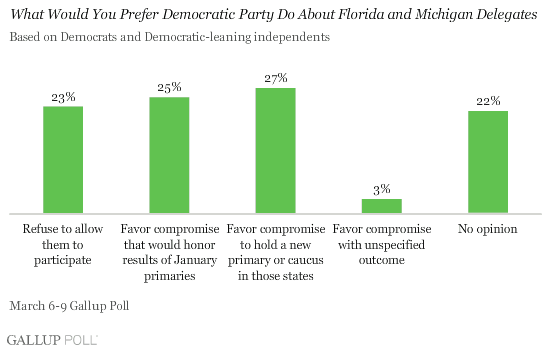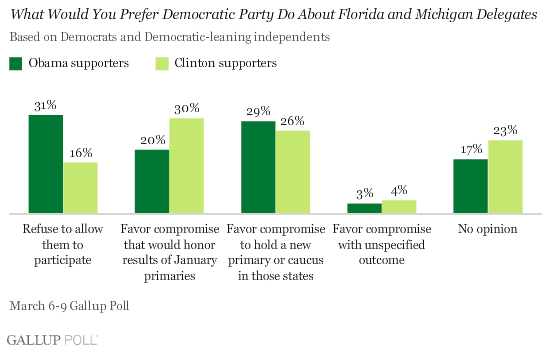PRINCETON, NJ -- The Democratic Party's rank-and-file favors allowing Florida and Michigan Democratic delegates to participate in this year's presidential nominating convention, but there is a considerable lack of consensus over exactly what the solution should be.

In general, most Democrats (55%) favor a compromise that would allow the two states' delegates to participate, rather than excluding those states' delegates entirely (23%), which is the current plan. Twenty-one percent do not have an opinion either way.
But those who favor a compromise divide almost equally between a "do-over" primary or caucus to be held in those states between now and the convention, and finding a way to abide by the results of the January contests in which neither Hillary Clinton nor Barack Obama actively campaigned (in Michigan, Obama was not even on the ballot) and no delegates were officially at stake.
Six in 10 Democrats say they are paying very or somewhat close attention to the controversy over the convention delegates from Florida and Michigan. The Democratic National Committee said it would refuse to seat a state's delegation at the convention if a state other than Iowa, New Hampshire, South Carolina, or Nevada held its primary or caucus before Super Tuesday (Feb. 5). Florida and Michigan party leaders attempted to defy that order by proceeding to hold their primaries in January. The DNC is holding firm in its position, and now those two states are faced with the possibility of having no voice at the convention. With the contest so close and every delegate important to the outcome, there is now considerable pressure on the DNC to find an acceptable solution.
Supporters of both candidates favor some sort of compromise. Clinton supporters are slightly more likely than Obama supporters to favor a compromise.
That in part reflects the reality of the situation -- because Clinton won both of the January contests, Obama supporters (31%) are understandably more likely to favor excluding those states altogether than are Clinton supporters (16%). Clinton supporters who favor a compromise tend toward advocating an outcome that would honor the January results, while Obama supporters who favor a compromise are more inclined to support a second binding primary or caucus in those states.

Those who are paying close attention to the controversy are not distinct from the party's supporters more generally in their preferences about resolving the outcome.
Implications
The Democratic rank-and-file does not provide much guidance to its party leaders as to how the party should ideally proceed in resolving the Florida/Michigan controversy, although there is a clear preference that something should be done to allow Michigan and Florida delegates to have a say at the convention.
Survey Methods
These results are based on telephone interviews with a randomly selected national sample of 528 Democrats and Democratic leaning independents, aged 18 and older, conducted March 6-9, 2008. For results based on this sample, one can say with 95% confidence that the maximum error attributable to sampling and other random effects is ┬▒5 percentage points.
Interviews are conducted with respondents on land-line telephones (for respondents with a land-line telephone) and cellular phones (for respondents who are cell phone only).
In addition to sampling error, question wording and practical difficulties in conducting surveys can introduce error or bias into the findings of public opinion polls.
